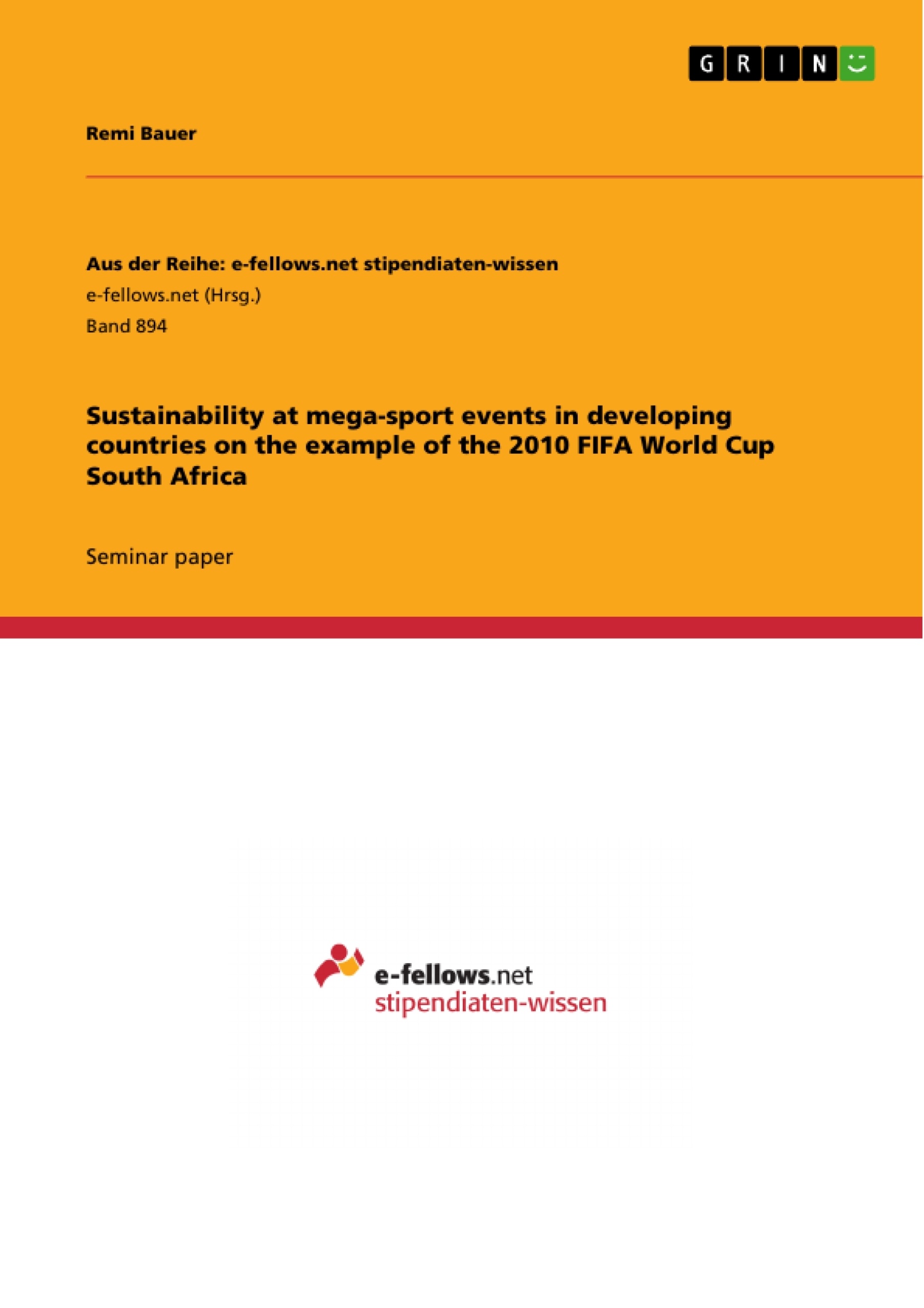With the London 2012 Olympic Games, sustainability within mega-sport events has come to attention again as the organisers of the event are seeking to create a truly green event (London2012 2009a, London2012 2009b). But not only developed nations are hosting such large-scale events. Recently, the FIFA World Cup was held in South Africa, the Commonwealth Games in India and the next Olympics will be staged in Brazil (Konrad-Adenauer-Stiftung 2011). Thus, this paper will deal with the following question. Can sustainability be achieved at mega-sport events in developing countries? The FIFA 2010 Soccer World Championships in South Africa will be used as a descriptive example of a past mega-sporting event. The goal of the paper is to answer this question while also giving a diligent insight and thorough understanding of the Triple Bottom Line Model.
Inhaltsverzeichnis (Table of Contents)
- 1. INTRODUCTION
- 2. SUSTAINABILITY
- 2.1 DEFINITION
- 2.2 SUSTAINABILITY AND MEGA-SPORT EVENTS
- 3. THEORETICAL APPROACH
- 3.1 TRIPLE BOTTOM LINE MODEL
- 3.2 PEOPLE, PLANET AND PROFIT
- 4. 2010 FIFA WORLD CUP SOUTH AFRICA
- 4.1 THE EVENT
- 4.2 TRIPLE BOTTOM LINE
- 4.2.1 PEOPLE
- 4.2.2 PLANET
- 4.2.3 PROFIT
- 4.3 CRITICAL ANALYSIS
- 5. CONCLUSION
Zielsetzung und Themenschwerpunkte (Objectives and Key Themes)
This paper investigates the feasibility of achieving sustainability at mega-sport events in developing countries, using the 2010 FIFA World Cup in South Africa as a case study. It aims to provide a comprehensive understanding of the Triple Bottom Line Model and its application to the context of mega-sport events.
- Defining sustainability and its relevance to mega-sport events.
- Introducing the Triple Bottom Line Model and its three key pillars: People, Planet, and Profit.
- Analyzing the 2010 FIFA World Cup in South Africa through the lens of the Triple Bottom Line Model.
- Exploring the potential for achieving sustainability at mega-sport events in developing countries.
- Assessing the social, environmental, and economic impacts of mega-sport events.
Zusammenfassung der Kapitel (Chapter Summaries)
- Introduction: This chapter sets the context for the paper by highlighting the growing importance of sustainability in mega-sport events and posing the key question of whether sustainability can be achieved in developing countries. The 2010 FIFA World Cup in South Africa is chosen as a case study to answer this question.
- Sustainability: This chapter provides a definition of sustainability and discusses its relevance to mega-sport events. It traces the historical development of sustainable practices in mega-sport events, highlighting the role of the International Olympic Committee and the implementation of initiatives such as Agenda 21 and the Olympic Games Impact Study.
- Theoretical Approach: This chapter introduces the Triple Bottom Line Model as the theoretical framework for the analysis. It defines the model's three key pillars: People, Planet, and Profit, and explains how these pillars contribute to achieving true sustainability.
- 2010 FIFA World Cup South Africa: This chapter provides a detailed description of the event, highlighting its significance as a major sporting event held for the first time in Africa. It also explores the event's potential to leave a positive legacy in economic, social-ecological, and environmental terms.
Schlüsselwörter (Keywords)
Sustainability, mega-sport events, developing countries, FIFA World Cup, South Africa, Triple Bottom Line Model, People, Planet, Profit, social impact, environmental impact, economic impact, legacy.
Frequently Asked Questions
Can sustainability be achieved at mega-sport events in developing countries?
This paper investigates this question using the 2010 FIFA World Cup in South Africa as a descriptive case study, analyzing social, environmental, and economic factors.
What is the Triple Bottom Line Model?
The Triple Bottom Line Model is a theoretical framework based on three key pillars: People (social), Planet (environmental), and Profit (economic).
How did the 2010 FIFA World Cup impact South Africa's environment?
The paper analyzes the event through the "Planet" pillar of the Triple Bottom Line to assess its ecological legacy and environmental initiatives.
What role does the International Olympic Committee play in sustainability?
The IOC has been instrumental in implementing sustainable practices through initiatives like Agenda 21 and the Olympic Games Impact Study.
What are the social impacts of mega-sport events in developing nations?
The "People" aspect of the analysis explores how such events influence local communities, social development, and the overall legacy for the host nation's population.
Is the 2010 FIFA World Cup considered a "green" event?
The paper provides a critical analysis of the event's sustainability claims, comparing them to the goals of creating a truly green mega-sporting event.
- Quote paper
- Remi Bauer (Author), 2012, Sustainability at mega-sport events in developing countries on the example of the 2010 FIFA World Cup South Africa, Munich, GRIN Verlag, https://www.grin.com/document/268657



